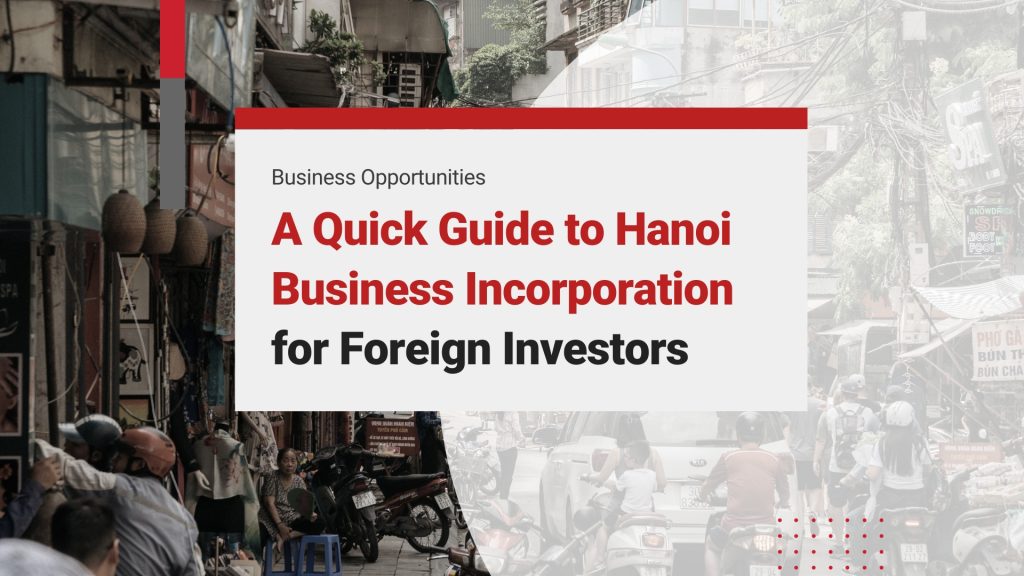Hanoi, Vietnam’s dynamic capital, is a hub of business opportunity and growth. Strategically nestled on the banks of the Red River and close to China, ASEAN’s key trading partner, Hanoi is a gateway to the region. The city is conveniently connected, with most ASEAN capitals just a 3-hour flight away, facilitating seamless trade and cooperation.
Moreover, Hanoi is at the heart of Vietnam’s infrastructure advancements, with ongoing projects such as new metro lines and connecting roads, enhancing mobility and accessibility. This bustling city also boasts some of Asia’s lowest living and operational costs, making it an attractive destination for foreign direct investment. Hanoi’s blend of strategic location, government focus on infrastructure, and cost-effectiveness positions it as an ideal locale for business incorporation and investment in the region.
Interested in Hanoi Business Incorporation? Check out InCorp Vietnam’s A-Z Business Incorporation Services
Economic Overview of Hanoi
Hanoi boasts a myriad of compelling advantages for businesses and investors. These include robust economic growth, a skilled and cost-effective workforce, streamlined administrative processes, favorable tax regulations, a strategic geographic location, and a substantial consumer market. These factors combine to create a highly attractive environment for business operations and investment opportunities.
Hanoi’s economy has demonstrated great potential in the first half of 2022 as the GDP grew by 7.79% compared to the same period in 2021. Moreover, the services sector expanded by 9.05% and contributed 5.91% to GDP growth.
There are approximately 3,530 tech businesses in Hanoi, bringing in about US$10.44 billion in income annually. Of FDI, the manufacturing and processing sector accounted for 37.2%. In addition, 16.7 million tourists brought in money for tourism and hospitality, while projects like Lotte Group’s US$300 million investment in the Ciputra Hanoi Mall helped the retail and wholesale industry flourish.
Here is a summary of the city’s economic growth (sector-wise)
| Sector | Increase (YoY 2021 – 2022) |
| Construction | 1.27% |
| Agriculture, Fishery and Forestry | 2.39% |
| Paper Production | 20.3% |
| Non-metallic Mineral Products | 18.5% |
| Prefabricated Metal Products | 16.1% |
| Wood Processing and Production | 15.5% |
Hanoi has demonstrated a robust growth trajectory in 2023, achieving a 6.27% increase in its gross regional domestic product (GRDP). This growth reflects a resilient and gradually strengthening economy, with each quarter outperforming the last: 5.81% in the first quarter, 5.91% in the second, 6.22% in the third, and an impressive 7% in the fourth quarter. These figures are especially significant considering the challenging global economic landscape and the contraction in global trade.
The service sector has been a key driver of this growth, expanding by 7.26% compared to the previous year and contributing 4.69% to the overall GRDP growth. Notable sub-sectors showing vigorous growth include administrative and support services (which encompasses tourism) with a 16.33% increase, arts, and entertainment at 15.39%, wholesaling, and retailing at 10.48%, finance, banking, and insurance at 7.77%, and transportation and warehouse services at 7.7%.
Meanwhile, the industry and construction sector also showed positive momentum, growing by 5.29% from the previous year and contributing 1.18% to the GRDP growth. The index of industrial production saw a modest year-on-year growth of 3%, with processing and manufacturing industries increasing by 2.6%. These numbers point to steady and balanced growth across various sectors, bolstering Hanoi’s economic resilience and potential for future development.
Expansion of Middle-class Population
A recent McKinsey report forecasts a significant expansion in Vietnam’s middle class, with an increase of 10 million within the next decade. By 2030, it is anticipated that Vietnam will have a middle-class population of 36 million. Furthermore, urban dwellers are projected to make up 44% of the total population, a trend that is expected to significantly boost both consumption and income growth across the country.
Most of Vietnam’s middle-class population resides in Ho Chi Minh City and Hanoi, housing more than 10 million in each city. However, urbanization will reach smaller cities like Can Tho, Da Nang, and Hai Phong over the next decade.
Find out more about Vietnam’s Middle-class Population here.
Government Support in Hanoi for Investors
Hanoi’s socio-economic landscape in 2023 paints a picture of robust growth and strategic development. The city achieved significant milestones, with 18 out of 23 set targets met, three of which exceeded expectations. A key highlight is the impressive 62% year-on-year surge in Foreign Direct Investment (FDI), accumulating nearly US$2.9 billion. This influx of investment, coupled with a 9% increase in social investment, underscores Hanoi’s emerging status as a vibrant economic hub.
The commercial vitality of Hanoi is further evidenced by the establishment of approximately 26,500 new businesses, marking a 6% increase from the previous year. This entrepreneurial boom, along with a boost in consumer spending and tourism, has led to a more than 10% growth in retail sales of goods and consumer services. The city also saw a flourishing tourism sector, surpassing targets in tourist numbers.
Fiscal prudence remains a hallmark of Hanoi’s economic strategy. The state budget revenues have soared, with an estimated total revenue exceeding VND 400 trillion (US$16.5 billion) – 113.5% of the planned budget and a 20% increase from the previous year. The export and import turnovers also reflect a positive trajectory, with exports estimated at US$17.3 billion and imports at US$44.2 billion, indicating balanced trade dynamics.
Hanoi’s urban landscape is undergoing transformative changes. Major urban planning and infrastructure projects are in motion, enhancing the city’s connectivity and livability. The focus on commercial, social, and resettlement housing projects, alongside the renovation of old apartment buildings, is a testament to the city’s commitment to sustainable urban development. Additionally, initiatives to improve clean water supply projects are underway.
Culturally, Hanoi is experiencing a renaissance with significant investments in education, healthcare, and monument renovation. The city plans to complete 1,005 projects by the end of 2023, enriching its socio-cultural fabric through revived cultural activities, sports, and festivals.
Complementing these developments, the government of Hanoi is diligently working towards bolstering the economy by embracing the “Industrial Revolution 4.0” and enhancing global integration. Focused on restructuring the administrative system and enhancing business conditions, the government aligns its efforts with OECD standards. This approach aims not only to stimulate economic growth but also to bridge the income gap between rural and urban areas by promoting social welfare activities and raising living standards.
Overall, Hanoi is charting a course towards sustainable, rapid development, making it an increasingly attractive destination for investors seeking to leverage its economic potential and growth-oriented policies.
Requirements for Opening a Company in Hanoi
There are four main types of legal entities you can consider when starting a business in Vietnam:
- Joint-stock Company: A more complex structure, suitable for medium and large companies that eventually want to be listed on the stock exchange.
- Limited Liability Company: Simple structure, suitable for small & medium entities
- Representative Office: This entity is allowed to hire, pay, and research only. No revenue is allowed to be accrued under this structure.
- Branch Office: this is an extension of your original company in the country of origin. You are essentially copying the structure of your original company and applying it in Vietnam
Read More: Detailed Information about 4 Business Entities for Doing Business in Vietnam
Once you’ve selected your perfect legal entity, here’s the process you have to follow to ensure a successful company setup in Hanoi:
- Register your company name;
- Get a registration certificate;
- Apply for a tax registration certificate;
- Obtain a stamp of your company;
- Register the company stamp with the local police in Hanoi;
- Open a bank account;
- Apply to receive E-invoices;
- Proceed with registration at the Vietnamese Labor Federation;
- Upon the publication of your registration notice on the National Business Registration website, pay for the tax of your business license;
- Register with the local Vietnamese office;
- Proceed with the registration of a social insurance fund for your employees (if any).
Related Read: Register Company in Vietnam Guide for Foreign Investors
We made the most detailed step-by-step guide for Company Incorporation in Vietnam for investors, now available as an interactive checklist:

Conclusion and Growth Predictions
By 2045, Hanoi is expected to become a regional economic hotspot accompanied by high standards of living. Moreover, the Politburo’s Resolution No.15 has set the stage for the city to develop strategies for the future.
As a significant economic region of northern Vietnam, Hanoi plans to be an integral part of regional and international competition by 2030. During 2026-2030, the Gross Regional Domestic Product (GRDP) is predicted to register 8.5% growth, demonstrating an estimated value of US$13,000. By 2045, it is expected to reach US$36,000, according to Vietnamplus.
Moreover, tasks like planning infrastructure construction, urban development, and resource management must be accomplished. As a city prioritizing education, training, science, technology, and healthcare, the local government has made it imperative to develop its culture and encourage polite and civilized Hanoians. In addition, citizens must be assured of social security, welfare, and improvement in their living standards.
About Us
InCorp Vietnam is a leading market entry and corporate services firm in Vietnam. We are part of InCorp Group, a regional leader in corporate solutions that encompasses 8 countries in Asia-Pacific, headquartered in Singapore. With over 1,200 legal experts serving over 15,000 Corporate Clients across the region, our expertise speaks for itself. We provide transparent legal consulting, setup, and advice based on local requirements to make your business fit into the market perfectly with healthy growth.
Don’t take our word for it. Read some reviews from some of our clients.









